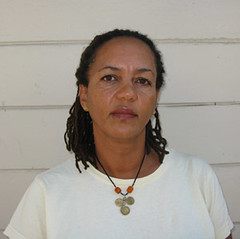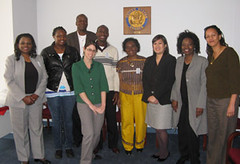Nunu Kidane, Director of the Priority Africa Network (PAN)
From Mobilize the Immigrant Vote!
Oakland, California
Her Story
At the age of 20, Nunu Kidane fled war and became a refugee. Her path took her from Ethiopia to Eritrea to Sudan to West Africa to Europe and finally to the United States. “Like a lot of refugees and immigrants,” says Ms. Kidane, “I always planned to return home. It was traumatic enough to leave my country, let alone to consider the idea of never returning. “
“When I came to the United States,” she continues, “I realized that there were many assumptions that were made about me, as an African, and about my race as a Black woman that I didn’t understand. There was very little knowledge of the issues in Africa. I felt I needed to play a role in changing the conversation about African immigrant and refugees and about Africa. In 2003, we founded the Priority Africa Network (PAN) to make ‘Africa a priority agenda’ – we sought to connect immigrant communities from different African countries with the urgent needs in Africa and to promote broader education about Africa within the United States.”
“Since our founding, we have sought to connect the African immigrant and refugee communities more directly with other immigrant communities, with the African American community, and with the broader efforts for civic engagement and social change. Four years ago, we started the African Diaspora Dialogues in which African immigrants engage with African American on issues of race, identity, culture and more. While these conversations are quite complex and long-term, they have been transformative for many of the participants.”
Women’s Leadership Development
The vast majority of the formal leadership of African immigrant and refugee organizations are men. Women play significant roles, but are often behind the scenes. “Young women’s leadership development in our communities is important,” says Ms. Kidane. “They have multiple identities – as immigrants, as Americans, young people, and as women.” Ms. Kidane shares that many young and older women leaders have a non-linear way of thinking that can be useful in strategies for building the power and identity of communities.
“It is PAN’s hope that we will have the resources to host a gathering specifically for African women leaders,” says Ms. Kidane. “Women are often more open to change, and we need separate spaces for women to come together.”
Civic Engagement and Policy Change

Comments Ms. Kidane, “It has been absolutely essential to connect broader civic engagement initiatives and public policy campaigns with the concrete needs of our communities, such as the education of immigrant children. At PAN, we talk about the fact that even though our communities care so much about education, very few parents sit on the local PTAs (Parent Teacher Associations). Our message is: ‘we know you care about your children’s schools, and you have a say in what happens there!’ ”
In May 2006, PAN convened a gathering of some 16 core African immigrant leaders to talk about immigrant rights and immigration reform. Many of the participants had misconceptions and believed that immigration policy had nothing to do with them, that it only had to do with Mexican immigrants who were crossing the Southern U.S.-Mexico border. “We have sought out concrete ways for African immigrants to engage in immigrant rights campaigns,” says Ms. Kidane. “For example, we succeeded in early 2010 in extending DED (Deferred Enforced Departure), similar to TPS (Temporary Protected Status), for 3,600 Liberians living in the United States through advocacy which resulted in an Executive Order by President Barack Obama. This has been a vehicle to engage our communities with their local Congressional representatives, City Council members, and School Boards and to talk about the many components of immigration reform.”
In thinking about the needs of immigrant women in regards to immigration reform, Ms. Kidane emphasizes the importance of advancing the needs of families. “The fear of attacks on undocumented immigrants is very real in our communities. We have women members who don’t leave their homes because they’re afraid they may not return. They see the contradictions of what they thought were values of democracy and freedom in this country with the current state of policies and it confounds them.”
Perhaps the most important point to remember when engaging African immigrant and refugee communities and women leaders is to create inclusive spaces through thoughtful planning, selection of images, language access, and more. “Media and community events for immigrants are often only in English and Spanish,” comments Ms. Kidane. “Our communities are receiving the message from multiple sources that the ‘immigrant’ identity does not include them, and we want to challenge that notion. For African immigrant and refugees, immigrant’ rights is also not only about their status as immigrants, but also about the history of racism and race in this country. It’s a journey for African immigrants to reflect on what it means to be Black in America.”
Conclusion
There is a real need to invest in capacity-building of African community organizations. These largely volunteer-run organizations can document all they are doing and become more integrated into the movement as agents of change. “If we want Africans, immigrants, and U.S.-born communities to forge a commonality, we must bring them together, and that requires resources,” comments Ms. Kidane. “The population size of African immigrants is growing. As the New York Times reported a few years ago, more Africans have come to America since 1970 than during the Trans Atlantic slave trade. Who is Black in America is changing, and we need to ensure that we are organizing our communities and ensuring that young and older African immigrant women are at the forefront of this change.”
For more information about Ms. Kidane and the Priority Africa Network (PAN), contact: Nunu Kidane, [email protected], www.priorityafrica.org . PAN is a partner organization with Mobilize the Immigrant Vote.
Tags: Priority Africa Network, Profile

